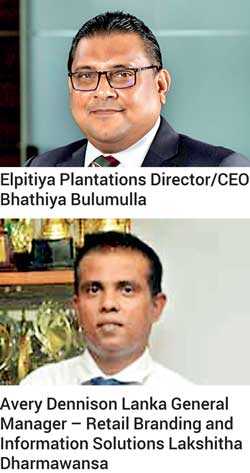Thursday Feb 19, 2026
Thursday Feb 19, 2026
Monday, 28 October 2019 00:02 - - {{hitsCtrl.values.hits}}
Creating a sustainable environment for businesses to thrive and an equally stimulating working environment which supports the aspirations of the modern day’s workforce is unprecedented. In this backdrop, the Employers’ Federation of Ceylon (EFC) will unfold its eighth edition of the annual symposium on the theme, ‘An Agenda for Change’ on 8th November at the Cinnamon Grand Hotel, creating a platform for the employers, employees and also policy makers to deliberate on how best ‘change’ could be championed.
Professionals representing a broad spectrum of sectors will share their expertise on three key areas of ‘Social Dialogue and Building Trust’, ‘Sustainable Enterprises’ and ‘Shifting Paradigms of the Workplace’. The dialogue will be facilitated though panel discussions and case studies.
Elpitiya Plantations PLC Director/CEO Bhathiya Bulumulla, who would lend his voice to session three of the Symposium under the banner ‘Shifting Paradigms of the Workplace: Emerging Forms of Work and Managing Stakeholder Aspirations’, remarks that while some efforts have been made by the plantation sector which he represents to embrace the trends of the digital world, much more remains to be done to revamp the traditional management culture of plantations.
“For example the use of drones for soil mapping, resource planning, fertiliser and chemical application are areas in which digital technology could be used. However, its adaptation has been slow. Further, efforts to digitise the entire salary statement and issue salary slips via mobile phones to give greater dignity to workers and also make the system more efficient are now being deliberated.”
In a bid to attract aspiring job seekers to the industry and also to re-skill the senior workforce, so that they don’t become redundant, several measures are being envisaged by the industry, says the senior professional. Clear commitment to the UNSDG of ‘Good Jobs and Youth Empowerment’ is at the core of these measures, he says. Re-skilling the workforce for the purpose of diversification into other crops such as the berries, advent of the Adventure Park, are all constituents of this process, he adds.
Bridging the gap between the management and the workforce and thereby managing multiple stakeholder aspirations often become challenging in the traditional plantation industry. Yet in shifting the paradigms of the modern workplace, this becomes inevitable.
“Diversifying the company’s asset base and moving into value-added business that are more lucrative and providing greater dignity to the employees are imperative if the industry is to bridge this gap,” says the Elpitiya Plantations’ CEO, who also cites increased value-added business such as manufacturing of finished products including packaging, providing more training opportunities and enhancing skills levels and competence as further interventions that could follow.
As a result of globalisation, today businesses have the choice of ‘where to do their business’, observes Avery Dennison Lanka Ltd. General Manager – Retail Branding and Information Solutions Lakshitha Dharmawansa.
A panellist of session three of the EFC’s Symposium, Dharmawansa further notes that, with digitalisation and autonomous production processes, cost of labour may not be the only deciding factor. “For businesses, choice of location is largely influenced by practicality and flexibility. In terms of domestic economic and labour policies as well as quality and attitude to skills available, Sri Lanka should create a balance between extreme employee-focused and ‘reasonably’ employer-focused approach. If not, the country may continue to loose advantage over upcoming new locations in the eyes of investors.”
Establishing a multi-representative forum drawn from key sectors in the country is vital if we are to plan the future talent framework in order to compete globally, opines Dharmawansa. Estimating and assessing skills metrics required within the next three to five years and forming a strategy to market and execute them is mooted by him. Using resources of the private sector to up-skill and re-skill the workforce is also proposed. “Private sector should also have projects to engage at school levels to educate the younger generation on future jobs so that we can manage the demand and supply of skills better in our job market.”
Changing our perceptions on people-training and development is also crucial says the professional who goes on to note that it should be seen as an ‘investment and priority’ in fund allocation mechanism. A shift in the workplace culture where both the management and employees will ‘feel’ for that change of culture cannot be undermined here says Dharmawansa. “Moreover, it is important that the organisational structure and hierarchy enable opportunity to apply learning for continuous improvement and right level of empowerment, replete with recognition and encouragement. Internships and training will thrive only in such an environment,” he notes.